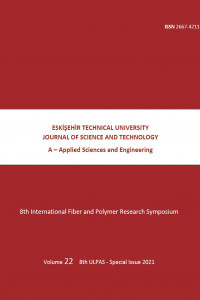Abstract
Composite materials have become a highly preferred technology nowadays in the industry with their advantages such as superior mechanical performance and weight loss for aerospace applications, especially due to the combination of different components and the formation of new products. In addition, with nanocomposites, this technology skips a step further and allows more effective products to be produced. Nanocomposites are produced using carbon allotropes such as graphene and carbon nanotubes, which have the title of being one of the strongest materials that have been the subject of academic studies in recent years.
Keywords
Supporting Institution
TÜBİTAK
Project Number
5189901, 20AG001
Thanks
The authors accept financial support within the scope of TUBITAK projects 5189901 and 20AG001. We also thank Bilkent-UNAM and Middle East Technical University for providing the necessary infrastructure.
References
- Novoselov KS, Geim AK, Morozov SV. Electric field in atomically thin carbon films. Sci 2004; 306 (5696): 666–669.
- [2] Hirata M, Gotou T, Horiuchi S, Fujiwara M and Ohba M. Thin-film particles of graphite oxide 1: high-yield synthesis and flexibility of the particles. Carbon 2004; 42(14): 2929–2937.
- [3] Yang QH, Lu W, Yang YG and Wang MZ. Free two dimensional carbon crystal-single-layer graphene. New Carbon Mater 2008; 23(2): 97–103.
- [4] Park S & Ruoff RS. Chemical methods for the production of graphenes. Nat Nanotech 2009; 4(4): 217-224.
- [5] Reina A, Jia XT, Ho J, Nezich D, Son HB, Bulovic V, Kong J. Large Area, FewLayer Graphene Films on Arbitrary Substrates by Chemical Vapor Deposition. Nano Lett 2009; (1): 30- 35.
- [6] Kosynkin DV, Higginbotham AL, Sinitskii A, Lomeda JR, Dimiev A, Price BK & Tour JM. Longitudinal unzipping of carbon nanotubes to form graphene nanoribbons. Nature 2009; 458(7240): 872-875.
- [7] Wang Z, Wei P, Qian Y and Liu J. The synthesis of a novel graphene-based inorganic–organic hybrid flame retardant and its application in epoxy resin. Compos Part B 2014; 60: 341–349.
- [8] Song L, Wang X, Pornwannchai W, Hu Y and Kandola B. The effect of graphene presence in flame retarded epoxy resin matrix on the mechanical and flammability properties of glass fiber-reinforced composites. Compos Part A 2013; 53: 88–96.
Abstract
Composite materials have become a highly preferred technology nowadays in the industry with their advantages such as superior mechanical performance and weight loss for aerospace applications, especially due to the combination of different components and the formation of new products. In addition, with nanocomposites, this technology skips a step further and allows more effective products to be produced. Nanocomposites are produced using carbon allotropes such as graphene and carbon nanotubes, which have the title of being one of the strongest materials that have been the subject of academic studies in recent years.
Keywords
Project Number
5189901, 20AG001
References
- Novoselov KS, Geim AK, Morozov SV. Electric field in atomically thin carbon films. Sci 2004; 306 (5696): 666–669.
- [2] Hirata M, Gotou T, Horiuchi S, Fujiwara M and Ohba M. Thin-film particles of graphite oxide 1: high-yield synthesis and flexibility of the particles. Carbon 2004; 42(14): 2929–2937.
- [3] Yang QH, Lu W, Yang YG and Wang MZ. Free two dimensional carbon crystal-single-layer graphene. New Carbon Mater 2008; 23(2): 97–103.
- [4] Park S & Ruoff RS. Chemical methods for the production of graphenes. Nat Nanotech 2009; 4(4): 217-224.
- [5] Reina A, Jia XT, Ho J, Nezich D, Son HB, Bulovic V, Kong J. Large Area, FewLayer Graphene Films on Arbitrary Substrates by Chemical Vapor Deposition. Nano Lett 2009; (1): 30- 35.
- [6] Kosynkin DV, Higginbotham AL, Sinitskii A, Lomeda JR, Dimiev A, Price BK & Tour JM. Longitudinal unzipping of carbon nanotubes to form graphene nanoribbons. Nature 2009; 458(7240): 872-875.
- [7] Wang Z, Wei P, Qian Y and Liu J. The synthesis of a novel graphene-based inorganic–organic hybrid flame retardant and its application in epoxy resin. Compos Part B 2014; 60: 341–349.
- [8] Song L, Wang X, Pornwannchai W, Hu Y and Kandola B. The effect of graphene presence in flame retarded epoxy resin matrix on the mechanical and flammability properties of glass fiber-reinforced composites. Compos Part A 2013; 53: 88–96.
Details
| Primary Language | English |
|---|---|
| Subjects | Engineering |
| Journal Section | Articles |
| Authors | |
| Project Number | 5189901, 20AG001 |
| Publication Date | November 30, 2021 |
| Published in Issue | Year 2021 Volume: 22 Issue: Vol:22- 8th ULPAS - Special Issue 2021 |


